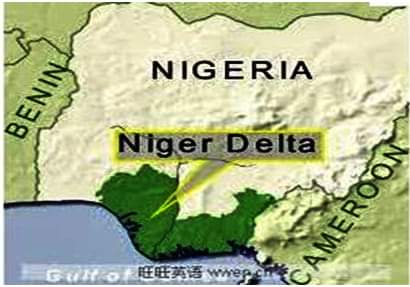THE MADNESS OF OIL by Abai Francis

Once upon a time in a community known as Niger Delta, dwelled a set of natives who lived very simple lives and keep to certain laws. For instance, every man believed it was his duty to protect and to provide food for his family by engaging in one form of decent work or the other. For the women, it was their duty to prepare the meals, care for the children at home and utilize the little time they have to support their husbands by taking to one form of trade or the other. In addition, everyone gave their allegiance to a chief head whose instructions were never taken for granted because he was believed to be the bridge between their departed ancestors and the people. Such was the kind of life they lead in the Niger Delta community.
Then one morning, some strangers came visiting the Niger Delta people. However, before their visit, the Niger Delta people had noticed the influx of these strangers at some other times but everyone were mindful of their business as it was a taboo to interfere in other people’s affairs.
The strangers met with the chief head and the people to sought permission to set up their business, which is to explore and mine a liquid substance they called black oil that had been discovered within the territories of the Niger Delta community. The people, being accommodating by nature, willingly gave up their lands and their permission to the strangers to carry on business. And so, the years rolled by.
Then one fateful morning, the people of the Niger Delta awoke to see portions of their rivers have been covered with the substance known as black oil, resulting in the death of many sea animals. At first, some of the ignorant ones harvested the dead fishes and used them for their meals. But when some of the people were dying mysteriously and findings indicated the deaths were connected with the contamination of the rivers by the black oil, they embarked on a protest against the strangers who were known to be dealers of the substance.
The Niger Delta people thereafter dragged the oil dealers to the nearest government court which ruled in favour of the natives and imposed a huge fine on their strangers to compensate them for their losses as well as clean up the environment within 90 days. And so, arising from that judgment, millions of naira were paid to each family in the Niger Delta community as compensation for damages done to their natural habitat which was the major source of their livelihoods.
The Niger Delta people had never seen such huge sums of money before. Some were even lamenting that the money was too much and were skeptical to collect the money but they later accepted the sums on the grounds that the effects of oil on the source of their livelihoods would take some time before it would be restored to normal.
Having received such huge sums, some of the natives relocated to other territories, especially the big cities to spend their bounties. Some threw parties and invited the entire neighborhood to have fun with them; others bought all kinds of fancy clothes, shoes and cars; and yet some of them took new wives. Life had taken a new favourable twist for them, so they thought. And in the rave of the excitement many did not even take notice when eventually their money ran out.
Majority in the cities who had no work to do after their money ran out went back home to the Niger Delta to continue their traditional trade. But behold, the effects of the oil had caused a lot of irreparable damage and getting a good catch was becoming a challenge for many. Moreover, the good life that money had brought them had sort of made many to become addictive to living such extravagant life.
No sooner, some began to find it very difficult to cope and to dwell in an environment which before the discovery of black oil was their little paradise. Indeed, the presence of basic and advanced infrastructures in the cities had caught up with many. And so, some began to nurse the idea of tampering with pipelines constructed to transport the black substance, all in a bid to create another opportunity for compensation to be paid to them so that they would taste the good life all over again.
In the course of that, some abandoned their traditional trade and started to source for jobs in the midst of the strangers while others began to device ways to duplicate the activities of the strangers so that they too can harvest their own black oil and make lots of money too.
And so it was that many of the natives began to burst oil pipelines and to set up local refining stations with no control over the devastating impact of the black substance on the environment. Several oil spill cases in court were turning out to the disfavour of the natives as the strangers were able to provide evidence of human involvement in majority of the pipeline spills.
Not quite long, the natives, who before the age of the discovery of black oil had lived simple and peaceful lives suddenly turned against their own kind as survival of the fittest sets in. They began to oppress one another over oil contracts and oil jobs. In no time, factions began to emerge as discrimination of over who is host to oil producing business and who is not, began to separate the people apart even though they all speak the same dialect and suffer from the same aftereffects of oil spills. Even the chief head who was believed to be a bridge between the ancestors and the living began to lose his influence as some of his judgments were perceived by the Niger Delta people as biased to favour some other groups among them.
The strangers, sensing the disharmony existing among the natives, quickly took advantage of the situation as they began to use those who are influential to silence majority who are the weak in the community. And government officials too were bought over by them to influence judgment and to further employ the divide and rule tactics in a bid to dodge government's responsibility to the natives.
Some of those in the Niger Delta community who felt oppressed decided to take their destinies into their hands by rallying together as armed group to forcefully press home their demands. And as always, splinter groups also began to emerge from within such group, propelled by greed and selfishness as they turned against each other. In no time, it became clear everyone was fighting for their personal interest as against the oppression of the people.
So it was that the once peaceful and evergreen Niger Delta community became a place of filth as rampant cases of pollution reigned supreme with corruption taking the lead, all resulting from a new social disease known as the 'Madness of Oil' that has infested the mindsets of the natives. Till date, no cure has been found for their ailment which has continued to grow worse!
#mystorydiscourse



